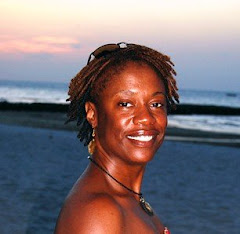 Looks like I'll be writing at least one BBC-related posting every week until I leave this freaking continent!! Every other morning, they're dragging me into the radio waves, in what NPR calls a "driveway moment."
Looks like I'll be writing at least one BBC-related posting every week until I leave this freaking continent!! Every other morning, they're dragging me into the radio waves, in what NPR calls a "driveway moment."That's when you're riding along in your car listening to an NPR story, and let's say you have a bag of groceries on the back seat, including maybe some ice cream. But when you finally reach your neighborhood and pull into your driveway, you don't want to leave your car until the story ends, even if it means letting the ice cream melt. THAT'S a driveway moment.
Nowadays, the BBC is regularly snaring me with a bunch of "doorway moments." Just when I have my purse and shoulder bag and all my other shit collected, and am about to call the cab to head to the office, something else catches my ear. But instead of my ice cream melting this morning, it was my heart. Not in the good way, mind you, but in the forlorn way, like when you're looking at that creamy puddle in the bottom of the carton, and technically it's the same stuff you bought at the store, but now it holds absolutely no appeal for you whatsoever.
Which kinda sounds like the trajectory of many relationships, no?? Which is what this morning's "doorway moment" was about. And it melted my heart with sadness and frustration, because it was only about the jillionth story I've ever read, watched or heard about educated Black American women being unable to find suitable Black male partners. They trotted out all the statistics, including the BIG GUN: One in every three Black American men will be involved in the criminal justice system at some point in their lives. Geez, seems like "just" 20 years ago, it was one in four, wasn't it???
I suppose it was totally unrealistic for me to ever expect that statistic was gonna change for the better in my lifetime. Numbers like that just can't, because they're about lack of access to quality education, and employment, and parental nurturance, and I certainly knew when I got on that plane in June of 2007 headed to East Africa that Black America was beyond the crisis point in that regard. I'd spent the past few years reporting on social policy, poverty and race-related issues for NPR, so if anybody knew that young Black boys and men in America are underneath the 8 ball, I did.
And of course, through the decades there've been all the stories about how if the average (White) American woman past the age of 40 had more chance of being kidnapped by a terrorist than getting married, then Black women could just call it a day FOREVER. I'd also read all the Essence Magazine articles suggesting we share a man, or join the "All Girls Team," or find an electronic solution, or just resign ourselves to raising our kids alone, or find joy and meaning in spending the rest of our lives alone. I think by the time I hit my late-30's, I had subconsciously accepted the possibility that I might never get married.
Of course, that didn't stop me from trying to find a man to share my life with, and if you've been reading this blog long enough, you know that most of those ill-fated attempts were with White men. I don't recall consciously excluding Black men, but I have to acknowledge that the same overwhelmingly negative stereotypes which sometimes impede Black American Male aspirations must have also steered me toward White men.
Fat lotta good THAT did me!!!! So, years later, I wind up on the African continent which is chock full 'o "Black" men, but where dramatic cultural differences, age, socio-economic status, and menopausal short-temperedness have made me even less inclined to traverse the Black Male/Female Relationship Realm. And most of the White men I meet here are already married, or they've brought their White girlfriends with them, or they're all, like, "If I AM gonna hook up with a woman of African descent, why not go for the 22-year-old lithe and limber Kenyan girl who will suck my brains out for $20 and a meal, and not utter a peep unless I tell her to, as opposed to, say, the (almost) 49-year-old, cranky, attitudinal Black American woman who's always gonna have to have the last word, and probably hasn't been able to raise her legs past knee level since the New Millennium started?"
Yeah, that's how I'M rollin' these days, my peeps! So it didn't exactly set a breezy tone for me this morning to hear yet ANOTHER dissertation on how utterly hopeless the Aspirational Black American Woman is, and always will be, when it comes to finding a life partner.
The more things change, the more I'm glad my ovaries are now permanently freeze-dried, and I don't have to worry about finding the mythical "father of my children." I'm just looking for somebody to hang out with, and maybe take a weekend trip to the Maasai Mara with. Is that too much to ask???

















